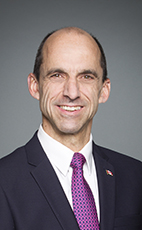Mr. Chair, I am pleased to join my parliamentary colleagues this evening to participate in the work of the committee of the whole on the Canadian government's main estimates.
This evening, it is not the main estimates we should be talking about. Since the Conservative government has been here in Ottawa, we could talk about the main investments in the economy and in Canadian taxpayers. There is investment in agriculture, investment for pork producers and dairy producers, investment in the environment, in budget 2008 in particular, to create a carbon exchange to make our country a world leader in fighting climate change. There is also investment in education, but especially for future generations by reducing the debt. That is the real sustainable development our Minister of Finance is creating for our country.
Thanks to the remarkable work of my colleague, the hon. Minister of Finance, the hon. member for Whitby—Oshawa, the Canadian economy is improving and growing and taxpayers are finally seeing their taxes go down instead of up. This is true both for individuals and businesses.
The results of all this are clear. Over the past 12 months alone, we have seen the creation of over 300,000 jobs. Since we came to power, 750,000 jobs have been created, 80% of them full time. These are jobs for people across the country. This contrasts with and is diametrically opposed to what our colleagues opposite want to see. Their problem is that they think government money is their money. On this side of the House, we think that government money belongs to taxpayers and should go back to them.
My question for my colleague, the Minister of Finance, is a simple one. How has he managed to stimulate the economy and reduce the tax burden on companies and taxpayers?
I would like to revisit one important element. The official opposition has come up with a proposal that worries me. The price of gas is higher than ever before. It is as high as $1.50 in some places. This is a big problem for people in my riding who commute to work.
My riding is far from urban centres. To move manufactured goods, we need a healthy economy, we need lower transportation costs, and we need the government to make sure that transportation costs do not go up. Now the official opposition wants to tax carbon and increase the cost of raw materials and the cost of transportation, even though these costs are already extremely high.
That worries me. I would like to know what the minister plans to do to protect us from these rising costs, these huge increases that will take a heavy toll on the Canadian economy. We know that these tax grabs affect not just businesses but people with low incomes, society's most vulnerable members and seniors. That is inconceivable in the current context, where even though we have an economy running at full throttle, we are also facing certain challenges.
The Liberal leader's own MPs think his plan is a bad one.
The Toronto Star reported:
Liberal MPs say one of their chief concerns is the bruising impact that higher energy taxes would have on the pocketbooks of middle-class and low- income Canadians already grappling with skyrocketing gas prices.
That was well put. Even the New Democrats recognize that it would harm businesses, families and people with low incomes. But there is one thing. Those two parties voted against—

